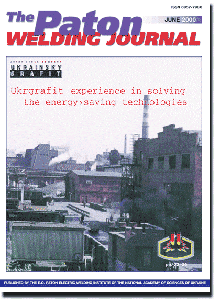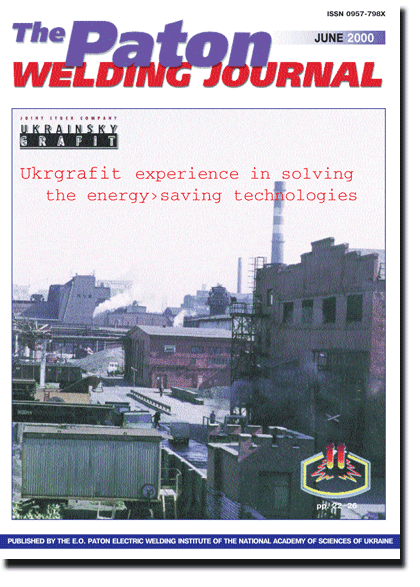

|
GARF E.F., NETREBSKIY M.A., YUKHIMETS P.S. and KOBELSKIY S.V. STRESS CONCENTRATION IN THE AREAS OF CORROSION DAMAGE OF PIPELINES |
2 |
| Finite element method and electric stain measurement means were used to study the concentration of stresses in the zone of corrosion damage of pipelines, simulated by the surface of an ellipsoid and a cylinder. It is shown that these defects can create a risk of cyclic elasto-plastic fracture while the required level of static strength is ensured. An approximate dependence for determination of stress concentration in the zone of surface corrosion damage has been determined more precisely. | |
|
SHLEPAKOV V.N., KOTELCHUK A.S. and NAUMEIKO S.M.
EFFECT OF NITRIDE-FORMING ELEMENTS ON COMPOSITION AND STRUCTURE OF LOW-ALLOYED WELD METAL |
6 |
| The effect of a complex alloying with nitride-forming elements on structure of a low-alloyed weld metal is studied. A feasibility of prediction of the primary microstructure of a single-pass weld is shown. | |
|
KUCHUK-YATSENKO S.I., KHARCHENKO G.K., FALCHENKO Yu.V.,
TARANOVA T.G. and GRIGORENKO S.G. FEATURES OF FERRITE BAND FORMATION IN VACUUM PRESSURE WELDING OF STEEL |
10 |
| The features of formation of a ferrite band in vacuum impact and diffusion welding of low carbon steels were studied. It is shown that it forms as a result of several processes occurring at the stages of heating, upsetting and cooling. The mechanism of ferrite band formation is proposed as a combined action of the diffusion and recrystallization processes. | |
|
PROTSENKO P.P. and PRIVALOV N.T. OPTIMIZING OF COMPOSITION AND TECHNOLOGICAL PROPERTIES OF ELECTRODE WIRE Sv-08KhG2SNMT FOR SHIELDED-GAS WELDING OF HEAT-TREATED LOW-ALLOYED HIGH-STRENGTH STEEL |
16 |
| The influence of main alloying elements in the wire on the effective ionization potential of the arc atmosphere and the thermodynamic activity of elements in multicomponent iron-based melts is considered. Welding and technological properties of Sv-08KhG2SNMT electrode wire were studied in comparison with series-produced wires. It is shown that complex alloying of the wires with chromium, nickel, molybdenum and titanium within optimum limits in a wide range of test temperatures provides a high impact strength of the weld metal which is attributable to its favourable structure. | |
|
PATON B.E., LAKOMSKY V.I., PETROV B.F. and KOROTYA A.S. IN A UNION WITH METALLURGISTS AND WELDERS - TO ENERGY-SAVING TECHNOLOGIES |
22 |
| Experience accumulated by scientists of the E.O. Paton Electric Welding Institute and specialists of the Open Joint Stock Company "Ukrainian Graphite" in the area of energy saving in production of graphitized electrodes is described. A new design of the short power circuit of graphitizing furnaces, welded carbon material - aluminium contacts and technology for field welding of the short circuit are proposed. | |
|
ISHCHENKO A.Ya., BONDAREV A.A., NAZARENKO S.V. and BONDAREV
Andr.A. TECHNOLOGY OF ELECTRON BEAM WELDING OF HIGH-STRENGTH ALUMINIUM ALLOY STRINGER PANELS |
27 |
| Comparative estimation of methods of manufacture of light stiffened panels of aluminium alloys is shown. Advantages of the electron beam welding process for manufacture of thin-walled panels from high-strength heat-hardened aluminium alloys are given. Technology of a single-sided welding of stiffeners of thin sheets and plates at ratio of thicknesses from 1:1 to 1:15 and higher is developed. It was established that the programmed heat input within the circuit of the electron beam scanning during welding is the most effective means of control of weakening and shape of penetration zone of T-joints. | |
|
SHEIKO P.P., ZHERNOSEKOV A.M. and SHEVCHUK S.A. REDUCTION OF METAL SPATTER IN CONSUMABLE-ELECTRODE WELDING IN CO2 |
31 |
| New approach to the solution of problem of a spattering decrease during CO2 welding is suggested. It consists in the fact that short circuits are created continuously with the help of electronic methods according to a preset program. A pilot model of the welding equipment using IGBT transistor is manufactured. The application of the mentioned approach allows the metal spattering to be decreased by 40-50 %. | |
|
ARSENYUK V.V. NEW METHOD FOR THE MANUFACTURE OF THERMOCHEMICAL CATHODES FOR PLASMATRONS |
34 |
| Results of investigations on vacuum percussion welding of zirconium and hafnium to copper for the manufacture of thermochemical cathodes for plasmatrons are given. Thechnological parameters of welding and forming of parts are determined. The technology and equipment developed for the manufacture of four types of the thermochemical cathodes are described. The new method for the manufacture of the thermochemical cathodes allows substantial saving of scarce metals, improvement in reliability and extension of service life of plasma installations. | |
|
MUZHICHENKO A.F. PACKAGE OF PROGRAMS FOR PREDICTION OF MICROSTRUCTURE AND MECHANICAL PROPERTIES OF HAZ METAL IN WELDING OF STRUCTURAL STEELS |
38 |
| The described software enables computation of structure and mechanical properties of the HAZ metal in welding of structural steels on the basis of t8/5 determined from the heat models, steel grade from the computer atlas of the austenite decomposition diagrams or chemical composition of steel from the regression models. | |
|
KOROTYNSKY A.E. DISCRETE-TIME CONTROL OF WELDING CURRENT IN POWER SOURCES OF LC TYPE |
42 |
| Device with a discrete-time controller of welding current, based on thyristor-semistor commutator, is described. It is shown that its application in the secondary circuit makes the schematic diagram of the LC type power source much simplier. Results of technological tests of this device in welding using the rutile stick electrodes are given. | |
| ZHUDRA A.P. and KIRILYUK G.A. FLUX-CORED WIRES FOR SURFACING | 45 |
| SEMINAR ON TECHNOLOGICAL EXPERIMENTS IN ORBITAL PILOTED SPACE STATIONS | 47 |
| ADVERTISING | 48 |
(You are viewing the simplified file contents)
Sorry, the PDF of this issue is not yet available
The cost of subscription/purchase order journals or individual articles
| Journal/Currency | Annual Set | 1 issue printed |
1 issue |
one article |
| TPWJ/USD | 384 $ | 32 $ | 26 $ | 13 $ |
| TPWJ/EUR | 348 € | 29 € | 24 € | 12 € |
| TPWJ/UAH | 7200 UAH | 600 UAH | 600 UAH | 280 UAH |
| AS/UAH | 1800 UAH | 300 UAH | 300 UAH | 150 UAH |
| AS/USD | 192 $ | 32 $ | 26 $ | 13 $ |
| AS/EUR | 180 € | 30 € | 25 € | 12 € |
| SEM/UAH | 1200 UAH | 300 UAH | 300 UAH | 150 UAH |
| SEM/USD | 128 $ | 32 $ | 26 $ | 13 $ |
| SEM/EUR | 120 € | 30 € | 25 € | 12 € |
| TDNK/UAH | 1200 UAH | 300 UAH | 300 UAH | 150 UAH |
| TDNK/USD | 128 $ | 32 $ | 26 $ | 13 $ |
| TDNK/EUR | 120 € | 30 € | 25 € | 15 € |
AS = «Automatic Welding» - 6 issues per year;
TPWJ = «PATON WELDING JOURNAL» - 12 issues per year;
SEM = «Electrometallurgy Today» - 4 issues per year;
TDNK = «Technical Diagnostics and Non-Destructive Testing» - 4 issues per year.


